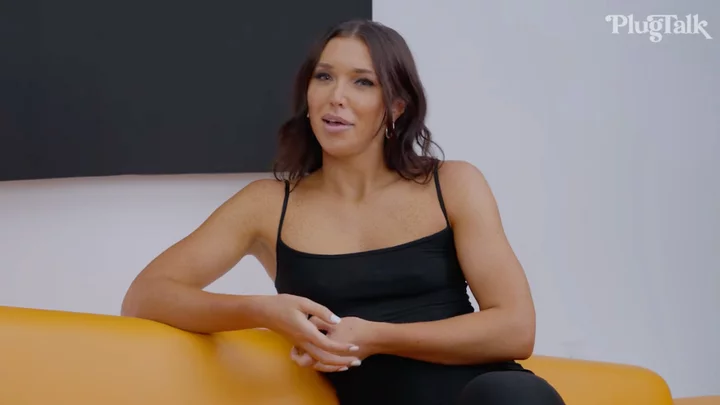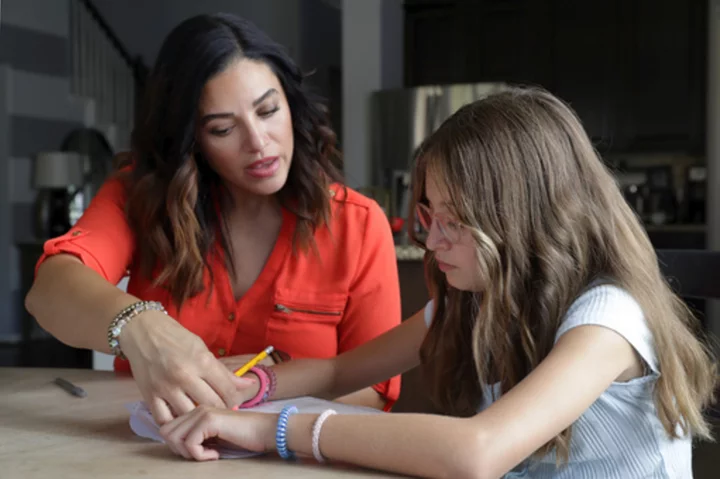
Model's dad 'staged an intervention' after discovering her adult account
An OnlyFans star has opened up about how her father “staged an intervention” after finding out about her X-rated career choice. Dre Delevingne spoke to Adam22 and Lena the Plug for their X-rated ‘Plug Talk’ podcast about her mum and dad’s discovery of her page on the subscription-only site. Delevingne explained that within 24 hours of setting up an OnlyFans account and posting a few “nudes”, her family were told about it. “They lost it,” she said, but admitted that she was “happy they found out” so quickly, because then she had “nothing to worry about.” “What was the source of your parents' rage? Just the fact that you were naked in general or was it the fact that you weren't taking advantage of the opportunities that they felt like they had afforded you?” Adam22 (real name Adam Grandmaison) asked. “Probably the second option,” she replied, acknowledging that they were “in shock”. However, she explained that she had always “deep down” wanted this life for herself, but felt that she couldn’t because of her “upbringing”. “[My parents] definitely were like, ‘Why did you do this? You could have had all of this’,” she recalled, adding that her response was: “But that doesn't make me happy, doing what I love makes me happy’.” Delevingne then recounted how her father “tried to [stage] an intervention” by waiting for her outside her home early one morning. “I basically walked out of my apartment and I was like, it's 6am, so I was asleep still and he was right in front of me,” she said. Describing his “rage and anger” she claimed her dad was “physical” with her, but stressed that she accepted this as “a father's reaction” However, she added: “Ever since then we just haven't been in no contact.” Asked whether she’d tried to “make sense” of her career choice to her dad, she said that she’d simply told him she’d “made [her] decision”. “He's like, ‘I'm taking everything away’. I'm like, ‘You can take it away, I can afford everything now’,” she recollected. “It felt so empowering to me that I was like, ‘Oh, no one can control me anymore’. It was just more like if I have to lose everything to get that, then that's OK with me.” Dre Delevigne on The Day Her Parents Found Her OF www.youtube.com Still, not all adult content creators suffer such rejection at the hands of their loved-ones. In an episode of ‘Plug Talk’ recorded last month, Emma Hix revealed how her mum reacted when she told her she was pursuing a career in porn. Admitting that she texted her mum to tell her, despite being just upstairs in the same house at the time, she said: “I thought she was going to freak out,” but instead she gave “total, full support”. “She was like, ‘I mean, I'm not happy that you're going to go do it [...] But she was also like, ‘Whatever you want to do, whatever makes you happy’.” Hix added: “Having that support, I would not be able to do this without it.” Sign up for our free Indy100 weekly newsletter Have your say in our news democracy. Click the upvote icon at the top of the page to help raise this article through the indy100 rankings.
2023-08-29 21:29

12 smart ways to save money on everyday back-to-school costs
Back-to-school shopping can create a hole in parents’ budgets at the best of times, but with a cost-of-living squeeze in full swing, money is particularly tight this year. At a time when every cutback counts, here are some ways to save some money on the costs that will earn you top marks for effort. 1. Check what you have This can be particularly useful if you have more than one child and need to pass items down. When sorting clothing, create piles of those that are in good condition, those that need repairs, and items that are beyond salvaging. Alice Haine, a personal finance analyst at investment platform Bestinvest, says: “Carry out a full audit to see what uniform, stationery items, lunchboxes and water bottles you already have. “You may find unused items still in pristine condition at the back of a cupboard, or used items that are good to go for a second or third academic year – after all, you only want to buy new if you have to.” 2. Create a ‘sell’ pile Haine suggests: “If your child has outgrown some of their uniform, sell them on Facebook Marketplace or WhatsApp groups, and use the cash to buy new items.” Vinted is worth a try, too. 3. List everything you need Once you’ve sorted through everything, make a list of the items you need to acquire. If you have a clear idea, you’re less likely to waste money doubling up, plus, you can buy what’s needed as and when you spot special offers. Depending on your circumstances, it may also be worth checking your government website for grants which could help with school uniform costs. 4. Be clear on school rules You could end up wasting your money if you buy items which don’t match school policies. Haine says: “If you are heading to a new school, check the uniform policy before you buy. Some schools may demand a certain style or colour.” 5. Team up with parents for ‘bulk buys’ “Some multipack prices may seem like great deals, but you might not need four items, so team up with a fellow parent to share the cost,” says Haine. 6. Remember that the cheapest price isn’t always the best value “When it comes to shoes, it can pay to go for a slightly better brand,” suggests Haine. “Cheap shoes can have a short shelf-life when you consider how much they get battered at school. Keep the receipt, because if shoes do fall apart over a short period of time, some stores may replace them with a new pair.” 7. Make sure there’s ‘growing room’ “Always go a size up if your child is still growing, especially on the pricier items, such as blazers, to ensure you get the most out of the investment,” says Haine. “Some brands even sell trousers with a grow-proof hem that can be let down and pressed with an iron, to ensure clothes last longer.” 8. Go refurbished Abigail Yearley, a spokesperson for website TopCashback.co.uk, says: “There are plenty of trustworthy and reliable sites that sell second-hand or refurbished tech, which works as good as new. Just make sure it comes with good warranty before buying.” You may also be able to buy refurbished devices directly from the manufacturer, she says. 9. Look out for second-hand items Check the school’s website for information on buying second-hand uniforms. “Many schools offer a pre-loved uniform service, so checking if that’s available to you should be the first point of action,” suggests Yearley. “If that’s not an option, check on the parents’ group chat if anyone is looking to give away or swap items they no longer need. It’s also worth scouting out Facebook Marketplace and popping into your local charity shops.” 10. Compare prices online Browsing online is a fast way to research and compare prices. Websites such as TopCashback can also help people to get some cashback on purchases from brands such as Clarks, Wilko and Dell, for example. 11. Look out for supermarket staples Tesco, for example, is running a discount deal on selected stationery and lunchtime essentials for its Clubcard members, until September 7, subject to availability. Yearley says: “All the big supermarkets tend to run back-to-school events during the summer months, so make sure you keep an eye out for them. “It’s especially worth checking out discount supermarkets like Aldi, as their back-to-school events are known for bargain prices. “Even if you’ve missed the special event, it’s worth checking their middle aisle, as often you’ll find things like stationery and lunchboxes, which are still cheaper than buying elsewhere.” 12. Get something back for donating M&S has expanded its ‘shwopping’ scheme, with dedicated school uniform shwopping boxes in over 200 stores, to encourage families to donate pre-loved school uniform, to be resold in Oxfam and through a pilot shop with eBay. As a thank you for shwopping school uniform, M&S Sparks customers can receive 20% off selected kids clothing from the retailer. Similarly, if last year’s school shoes are now a battered pair of Kickers, you can recycle them through their Reskinned initiative, which will also get you £15 towards a pair for the new school year. And Schuh offer a £5 voucher for every pair of unwanted shoes you donate, as part of their Sell Your Soles scheme. All these savings really do add up. Read More How to help your child make friends at secondary school Parents should already start getting their kids ready to go back to school, according to research Charity boss speaks out over ‘traumatic’ encounter with royal aide Ukraine war’s heaviest fight rages in east - follow live
2023-08-29 19:52

Study reveals the ideal temperature for getting a good night’s sleep
Scientists have found the ideal nighttime bedroom temperatures in which older adults can get their most restful sleep. Previous research has shown that older adults often experience inadequate, restless and disrupted sleep. And the findings of the current research, published recently in the journal Science of The Total Environment, also underscore the potential impact of the climate crisis on sleep quality in older adults, particularly those with lower socioeconomic status. This in turn influences many of their health outcomes such as cognitive and physical function, mood and affect, irritability and reaction to stress, productivity, diabetes management and risk of cardiovascular diseases. Scientists, including those from Harvard Medical School in the US, have found in their current research that sleep can be most efficient and restful for older adults when nighttime bedroom temperatures are between 20-25 degrees Celsius. The study also observed an overall trend of about 5-10 per cent drop in sleep efficiency once the nighttime ambient temperature increased from 25-30C. While poor sleep is disproportionately more common among older adults, research on its causes has not focused substantially on the environment the person sleeps in, said scientists. In the latest study, scientists examined the association between bedroom nighttime temperature and sleep quality in a sample of community-dwelling older adults. They monitored sleep duration, efficiency and restlessness of the participants using wearable sleep monitors and environmental sensors over an extended period within their homes, while controlling for potential confounders and covariates. Overall, researchers collected nearly 11,000 person-nights of sleep and environmental data from 50 older adults. “These results highlight the potential to enhance sleep quality in older adults by optimizing home thermal environments and emphasizing the importance of personalized temperature adjustments based on individual needs and circumstances,” study lead scientist Amir Baniassadi said in a statement. “Our study underscores the potential impact of climate change on sleep quality in older adults, particularly those with lower socioeconomic status,” the scientist said. In further studies, scientists plan to continue this line of work by focusing on the potential impact of the climate crisis on sleep in low-income older adults, and develop interventions to optimise their environment. Read More The top things to make you feel good and boost your mood, according to study A broad genetic test saved one newborn's life. Research suggests it could help millions of others Snoring before age 50 is a health ‘red flag’, experts suggest
2023-08-29 19:28

The dish that defines me: Evelin Eros’s rum cake
Defining Dishes is an IndyEats column that explores the significance of food at key moments in our lives. From recipes that have been passed down for generations, to flavours that hold a special place in our hearts, food shapes every part of our lives in ways we might not have ever imagined. As a teenager growing up in Hungary, the summer school holidays were usually spent at home because my parents were still working. They would leave us a list of house chores we needed to do before they left for work in the morning, and it included cooking our own meals, so I learned at an early age that I really enjoy cooking. I love cooking traditional Hungarian food, but I was also keen to experiment with other recipes and there was one day when I was looking for something to cook for that evening, just anything. My friends and I would go to the local library regularly, and on this day, I went and found an old cookbook in the food section. It looked about a hundred years old, it was falling apart, some pages were missing and others were stuck together. But I browsed through it and found a cake recipe involving plums soaked in rum that I thought sounded delicious. The recipe was incomplete because of the state of the book, but I wrote it down in my notebook anyway because it sounded good and I really wanted to try it. I resolved to make it for our dessert that evening. I went to the supermarket and went to search for all the ingredients for the cake. What I wasn’t expecting at the time was how expensive they would be – thinking back now, it makes sense that rum, plums and vanilla would not come cheap, but I was young and didn’t really know the price of things like that. It turned out to be quite an expensive shop, particularly for a 16-year-old using her own pocket money, but I didn’t mind too much as I was convinced it would be great! I got home and started getting ready to cook. It was around this time that I realised just how incomplete the recipe was. It confused me – for example, it seemed to call for just milk and eggs in the batter, there was no flour. But I pressed on and told myself that the recipe writers surely knew what they were doing. I mixed everything in a bowl and it was very, very liquidy, almost like water, which worried me. I poured the batter into a pan and into the oven it went. Now, the recipe said it would only take 20 minutes to cook. But as much as I wanted to trust the recipe, this part made me doubtful because of how liquid the batter was. So I waited and waited, but it remained stubbornly liquid. I wasn’t even sure if it would be edible. After an hour and a half of waiting, I used the toothpick method to see if it was cooked. I inserted the toothpick into the middle of the cake and when I removed it, it was sticky but no batter was left on it, so it looked like it might be OK to take it out. By this time, I had used so much electricity and energy that I was anxious to get it out of the oven. I took it out and left it on the kitchen counter to cool down. I told myself: “Maybe it will be solid by the time I come back.” It did smell amazing because of the vanilla and rum and plums, almost like Christmas cake that filled the house. But to be honest, I had a bad feeling about it. It looked horrendous, the most disgusting-looking cake I had ever seen. At least it looked solid, so I thought OK, that seems fine-ish. After a while, I figured it had cooled down enough so I tried to get it out of the tin. I had used a cake tin that you push up from the bottom to release the cake. While I was pushing the bottom, I don’t know what happened, but the cake slipped and the whole thing just fell onto its face on the floor. I remember standing there for a moment and thinking, I just spent a bloody fortune on this cake and it’s fallen in the dirt on the floor. I rushed to my room in tears, I just couldn’t deal with it. I was so sad. My 18-year-old brother had been in his room the whole time and heard me slamming my door. He must have wondered what happened because I heard him come out of his room and go downstairs to the kitchen. I stayed in my room for a little while feeling sorry for myself, before pulling myself together and heading back out to go and clean up the mess I made. I went down the stairs and I kid you not, saw the funniest scene before my eyes. My brother was on his knees in the kitchen, literally eating the cake from off the floor. I said: “What the hell are you doing?” He told me it smelled and tasted amazing, he couldn’t resist. It reminded me of the Friends episode “The One with All The Cheesecakes”, because there is a scene where Rachel and Chandler are eating cheesecake off the floor in their hallway. It was hilarious that it was happening to me in real life. I didn’t join my brother on the floor, but I did try a little bit of the cake once we picked it up from the floor. It was really tasty even though it wasn’t quite done, but it wasn’t the total failure I thought it was going to be. He offered to get me more eggs so I could try and recreate it again. The next time I made it, I made some adjustments and it turned out bloody amazing. Now, after a lot of experimenting and tweaking the original recipe, I’ve kind of mastered it. It is still expensive to make, so I decided I would only make it for celebrations and for Christmas. I even entered my recipe in an online competition. One of the prizes was a Jamie Oliver cookbook and my dad absolutely adored him. I enlisted his help to submit my entry because I didn’t have a laptop at the time, and it turned out to be a fun thing for us to do together. Some time later, I checked my email and found out I won the competition! Both Dad and I were stunned because I was worried my recipe was too complicated and nobody would want to make it. When we received the book prize, Dad was definitely more pleased than I was. It was a great thing for both of us to do. I genuinely believe that making this cake taught me the power of not giving up. That lesson has followed me throughout my life ever since. I am now an archaeologist living in Glasgow, but it hasn’t been an easy journey. I have had to persist with things even if they don’t go according to plan and keep motivating myself to get here. I think this random cake I picked out of an old book in a library has helped shape my attitude towards life. I’m also really glad my brother ate it off the floor because if he hadn’t, I would never have learned those lessons and maybe, I would be in a very different place today. Evelin Eros is a Hungarian archaeologist living in Glasgow. She makes her rum cake every Christmas and for other special occasions. Read More The dish that defines me: Mallini Kannan’s baked honey-soy salmon The dish that defines me: Frank Yeung’s prawn wontons The dish that defines me: Alex Outhwaite’s Vietnamese bun cha ‘It started with a radish’: Chef Simon Rogan reflects on restaurant L’Enclume at 20 The true story – and murky history – of Portuguese piri piri oil ‘My depression stopped me doing what I loved most in life – cooking’
2023-08-29 19:16

AMLO’s Insular Politics Predicted a Global Shift, But Will It Protect His Legacy?
On a Saturday afternoon in early July, Mexico City’s vast Zócalo square was packed wall-to-wall with supporters gathered
2023-08-29 18:22

How to help your child make friends at secondary school
Back to school… those three words mean many things to many people – but it’s safe to say, with a new school year comes the unknown: What will it be like, and will I fit in? “Starting a new school year can stir up an array of emotions in young people,” says Yvonne Kekeliadis, creator of Brightstarz, an organisation which runs workshops to help teens and tweens learn life skills. “The prospect of academic and social pressures, whilst exciting for some, can leave others feeling dread and trepidation as the summer holidays draw to a close.” She says building up a social safety net of peers in whom they can confide is a critical part of ensuring young people feel supported – and enjoy their time in secondary school. This is particularly important for children making the leap from primary school to secondary, says Kekeliadis. “Therefore, it’s imperative young people are equipped with the skills and support to be able to foster healthy, positive friendships.” Principal at Impington Village College, a high-ranking state school, Victoria Hearn says: “The transition to the next stage of their education can be an exciting time for students, but for some, the change of routine, environment, and teachers, coupled with the loss of some of their established network of friends, can be daunting.” Secondary school should be an enjoyable and enriching experience for every student, says Hearn, and building a strong friendship group can play a key role in making this a reality. Key tips which parents should share with their child include… Be proactive and don’t be afraid to reach out to others “The most important thing for students starting secondary school to remember, is that everyone is in the same boat,” says Kekeliadis. “Moving from a small class of 30 to a school year of more than 100 can feel incredibly daunting – and while it takes confidence to put yourself out there and take the first step, it will help to put others at ease who will be feeling shy, too.” Be open-minded Kekeliadis says a part of what makes starting secondary school exciting is being able to take part in new activities and initiatives, such as sports clubs and other extracurriculars. “This also provides a fantastic opportunity for students to meet peers who share similar interests,” encourages Kekeliadis. “Helping them to form a bond and eventually a friendship.” As well as taking advantage of an array of extracurricular activities, Hearn says to encourage them to support local, national, and international volunteering projects. “Which enables them to meet new people and work together to support a cause greater than their own individual needs.” Set healthy boundaries “When young people enter a new social situation, they are likely to feel pressure to fit in, and while having a strong social group is important to a child’s wellbeing, it’s vital young people know how to step away from an unhealthy friendship,” advises Kekeliadis. To encourage the setting of these boundaries, she says parents should ensure their child knows that it’s okay to tell a friend ‘no’ when they are feeling uncomfortable – as well as when it’s best to speak to an adult if they feel they are being pressured. Conversation is key Parents, guardians, and teachers can all have a positive impact on a student’s ability to make friends, says Hearn, but it’s important to remember every child is different and moves at their own pace. “If your child hasn’t made hundreds of new friends within the first week of school, it doesn’t necessarily mean they won’t soon establish a strong friendship group. “At all times, but particularly around periods of change, I encourage parents and guardians to engage in frequent open conversations with their child(ren), to check in with them regularly,” advises Hearn. “And, most importantly, validate their feelings.” Listening to your child’s concerns and providing reassurance is often all students need to approach making friends with confidence, suggests Hearn. Ask for support Hearn says at the heart of every education provision should be a desire to help all children thrive… “For the last four years, we have not grouped students with their friends from previous schools when they join us in Year Seven,” notes Hearn. “Instead, we create mixed ability, balanced groups, where students are able to interact with a wide range of other pupils.” She says this has proved hugely successful in ensuring all students feel they are included – and presented with the best opportunities to make new friends. “Your child(ren)’s school should also have an established pastoral support network to help them through any challenges they are facing,” says Hearn. “Please encourage your child to reach out to their tutor when necessary,” she urges. “Or, if required, contact their school directly with any concerns.” Hearn continues: “The transition to secondary school can be daunting for students, but with the support of families and teachers, we can ensure every child gets the absolute most out of their experience – and establishes friendships that will extend far beyond the school walls.” Read More Charity boss speaks out over ‘traumatic’ encounter with royal aide Ukraine war’s heaviest fight rages in east - follow live 9 ways to make dark rooms look lighter Men experience imposter syndrome too – here’s how to overcome it This is how stress affects different parts of the body
2023-08-29 17:51

This Airline Has Added Child-Free Sections on Long-Haul Flights
How much would you be prepared to pay to ensure there are no screaming babies, tearaway toddlers or
2023-08-29 16:50

Men experience imposter syndrome too – here’s how to overcome it
Imposter syndrome isn’t a disease, but it can do real damage to our confidence and self-esteem if it’s goes unchecked. And while it’s often associated with women, men can experience it too – as recently highlighted. Speaking on BBC Radio 4’s Last Word recently, Mike Parkinson revealed that his father, Sir Michael Parkinson – who died aged 88 earlier this month – dealt with “imposter syndrome” and “was wracked with self-doubt”. He went on to say that the well loved late chat show host, who interviewed the likes of Victoria and David Beckham and Muhammad Ali during his career, “didn’t have as much self-confidence as he appeared to have on TV”. The director also said that despite his father’s obvious success, he was “still very class ridden” and “very insecure”. These words will no doubt strike a chord with many. Here’s a closer look and imposter syndrome and what men can do to help manage it. What is imposter syndrome? “Impostor syndrome is not a mental illness. It is rather a term applied to the internal psychological experience of feeling like a fraud in a particular area in your life, despite evidence of success or external validation,” says Dr Jon van Niekerk, group clinical director at Cygnet Health Care. It is also a myth that men do not suffer from impostor syndrome... “It might come as a surprise to some, but it is fairly common experience, with 70% of people having at least one episode at some point,” he adds. “It is also a myth that men do not suffer from impostor syndrome. In fact, research has shown that if surveys are anonymous, there are similar levels of these symptoms between men and women. The difference is that men can find it more difficult to talk about these feelings.” What signs might they experience? Dr Elena Touroni, consultant psychologist and co-founder of The Chelsea Psychology Clinic, believes at its core, imposter syndrome is associated with “feelings of self-doubt sparking fears of being ‘exposed’ as a fraud, or diminishing genuine achievements and attributing them to luck rather than skill”. She adds: “On the surface, these internal battles might manifest as overworking to prove one’s worth, delaying tasks due to fear of imperfection, or an unending quest for validation.” As a result, van Niekerk says men could “compensate by overworking to achieve impossible standards they set themselves. Many people that have impostor syndrome are ‘overachievers’ and their personal and family life suffers. “Some people also self-sabotage their relationships, as they do not believe the deserve affection from others,” he adds. “If not managed well, it can ultimately lead to burnout and more severe mental health issues, like depression and anxiety.” What are the possible causes?There are various factors that play a role in imposter syndrome, especially as people may have different triggers for these feelings, and in different areas of their lives. “These feelings and beliefs can often be traced back to schemas – mental blueprints formed by our early experiences,” says Touroni. “These schemas shape our perception of ourselves, the world, and our place in it. When early experiences involve neglect, abandonment or overly critical parents/caregivers, it can lead to a lasting belief of not being ‘good enough’.” How can men overcome imposter syndrome? Reflecting on your strengths and positive past experiences is often a great place to start. “It is important to not just accept self-defeating thoughts. If you experience these thoughts, it is important to note them and remind yourself of why you are in a particular position, and what past accomplishments you have had,” says van Niekerk. “Once you open up, you will be surprised how many people struggle with similar thoughts. Usually, these settle down once you have been in a particular role for some time, but if they impact on you pursuing your goals or your relationships, it might be helpful to speak to a therapist.” Touroni adds: “Imposter feelings tend to run deep. But, with dedication and the right support, they can be challenged and changed. A therapist can help you unearth the origins of these beliefs, challenge their accuracy, and cultivate healthier, more empowering perspectives and coping mechanisms.” Read More Charity boss speaks out over ‘traumatic’ encounter with royal aide Ukraine war’s heaviest fight rages in east - follow live 8 of the coolest plants for shady gardens This is how stress affects different parts of the body Curls feeling frazzled? 6 ways to repair summer hair damage
2023-08-29 15:47

The math problem: Kids are still behind. How can schools catch them up?
Across the country, schools are scrambling to catch up students in math as post-pandemic test scores reveal the depth of missing skills
2023-08-29 12:25

Florida Braces for Disaster With Idalia Set for Explosive Growth
Florida is bracing for a major hurricane that is poised to bring life-threatening winds and storm surge to
2023-08-29 08:22

Adele reveals she collapsed backstage at Las Vegas residency over a spinal condition
Adele has opened up about her health after experiencing a flare-up of her spinal condition during her Las Vegas residency. During one of the “Hello” singer’s recent concerts - as part of her “Weekends with Adele” residency at The Colosseum at Caesars Palace - she explained to fans that before stepping on stage, she had fallen and was unable to move due to a sciatica attack. A sciatica flare-up comes from the sciatic nerve when it is compressed or irritated. When this happens, a person can experience pain that radiates from their lower back all the way down to their feet. “They picked my whole body up off the floor,” Adele explained to the crowd, according toThe Sun. The singer also revealed to the audience that she had to take a break mid-show over the weekend, saying: “I am going to sit down and rest my sciatica.” This isn’t the first time the “Easy on Me” singer has spoken openly about her health. During a performance on New Year’s Eve last December, Adele struggled to walk across the stage as she explained her chronic back pain and sciatica. “I have to waddle these days as I have really bad sciatica," she said at the time. Not only was she struggling to walk, but she also shared that she was performing with a disintegrated disc in her spine. “Is anyone else kind of my age starting getting bad knees? I have got really bad sciatica in my left leg and my L5 disc is not f***ing there anymore. It’s worn away,” she said back in February. The L5 spinal nerve provides sensation to the outer side of the lower leg, the upper part of the foot, and the space between the first and second toe. The nerve also controls hip, knee, foot and toe movements, according to the Cleveland Clinic. The sciatic nerve consists of the L4 and L5 nerves plus other sacral nerves, the website states. In an interview with Elle last year, Adele also said that she slipped her L6 disc when her son, Angelo, jumped out to scare her as she came out of the bathroom. The singer previously toldThe Face magazine in a November 2021 interview that her back issues go back to her teenage years. “I slipped my first disc when I was 15 from sneezing. I was in bed and I sneezed and my fifth one flew out. In January, I slipped my sixth one, my L6. And then when I had a C‑section, my core was useless," she said. Adele explained that she had lived with back pain for most of her life, and that her flare-ups occurred when she was stressed or continuously sitting with bad posture. However, she revealed that key to improving her symptoms was regularly working out. “Where I got my tummy strong, down at the bottom, which I never had before, my back doesn’t play up as much,” Adele said. “It means I can do more, I can run around with my kid a little bit more.” Read More Adele halts show to rebuke security guard hassling a fan: ‘Leave him alone’ Adele says she wants to have a baby with boyfriend Rich Paul ‘soon’ Miley Cyrus was ‘thinking of Adele’ while writing new song ‘Used to Be Young’
2023-08-29 05:54

Amazon is raising free-shipping minimums for some customers who don't have Prime memberships
Amazon has been quietly raising the amount some customers must spend on its site to get free shipping
2023-08-29 04:53
